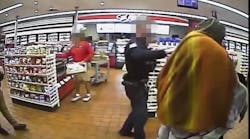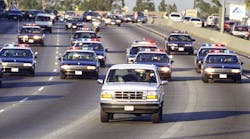In the wake of the shootings of two troopers this week, the West Virginia State Police might re-examine its arrest procedures, a spokesman said Thursday.
The man who shot the officers - one fatally - was already handcuffed and in the back of their cruiser when the shootings occurred.
"Our policy and procedure manual is a fluid document," State Police spokesman Sgt. Michael Baylous said. "We're constantly looking at it and adjusting it."
On Tuesday, Cpl. Marshall Lee Bailey and Trooper Eric Michael Workman, both of the Clay County detachment, were shot after arresting Luke Silas Baber, 22, of Oak Hill, during what they thought was a routine traffic stop at the park and ride at the Wallback exit of Interstate 79.
Bailey was killed; Workman remained in critical condition at CAMC General Hospital Thursday evening. (Editor's Note: Trooper Workman died Friday.)
Baber - who also wounded tow truck driver William Frank Massey and Roane County Sheriff's Deputy John Westfall before being killed - was handcuffed, with his hands in front of him, and put into the back seat of the patrol car, State Police officials said Wednesday.
Baber was able to retrieve a gun he had hidden in the groin area of his pants, and shot both troopers in the back of the head from the back seat of the cruiser, State Police officials said. At a news conference Wednesday, State Police Superintendent Col. Jay Smithers said the troopers had patted Baber down, but apparently missed the handgun.
State Police cruisers typically don't have a wire mesh screen or glass barrier between the front and back seats of the car, Baylous said. Bailey and Workman's cruiser was not equipped with such a barrier, he said.
Whether barriers should be added to the cruisers is one of several things the State Police might review in the wake of the shooting.
"In any critical incident that we have, we have an after-action review and decide what changes can be made, if any, to enhance the safety of the officers and the public," Baylous said. "We have a planning and research section, and they're constantly trying to enhance officer safety and looking at court cases to make changes to the [policy] documents."
He said the State Police also might make changes to its arrest and handcuffing policies because of the incident.
Many police departments have policies that require all suspects to be handcuffed with their hands behind their backs, palms turned outwards, to make it harder for a suspect to get out of the handcuffs or get access to a weapon. Exceptions can be made if a suspect is pregnant, obese or has a serious health condition.
However, some departments give officers the discretion to handcuff someone with their hands in front of them if suspects are cooperating with officers, are not thought to be a threat or are being arrested on a misdemeanor charge.
That's the case with the West Virginia State Police, Baylous said.
"In a situation like they were in, it's at a trooper's discretion [whether to handcuff in the front or back]," Baylous said.
When Bailey and Workman first stopped the Chevrolet Silverado that Baber was driving, they were responding to a reckless driving complaint, Baylous said. "They didn't know at the time they were involved with someone who had stolen a truck and had other issues," he said.
The State Police found out later that Baber had an arrest record. He had been convicted of domestic battery after threatening his parents with a BB gun.
Bailey had been with the State Police for 17 years at the time of the shooting, while Workman had been with the department since early 2011. "They based their actions on the circumstances as they were at the time [Baber was handcuffed]," Baylous said.
"Bailey was a veteran trooper," Baylous said. "Based on his experience, he was weighing into his decisions whether this guy was cooperating and things of that nature."
The State Police will look more closely at the incident and decide what lessons might be learned from it, Baylous said - in the future.
"We're still so much in the grieving process we haven't had time to address those issues," he said. However, he added, "Officer safety and the safety of the public are always in the forefront of anything we do."
Reach Rusty Marks
or 304-348-1215.
Copyright 2012 Charleston Newspapers



